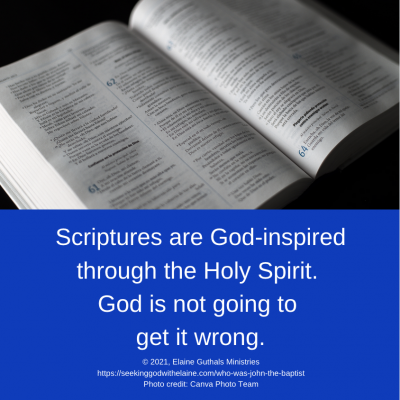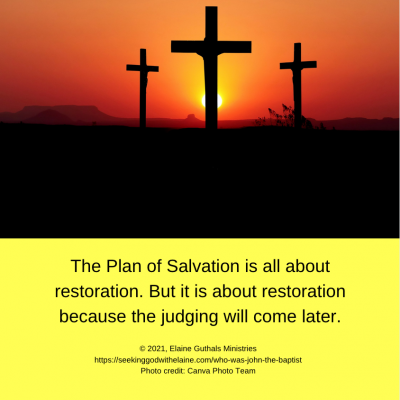John the Baptist played an important part in Jesus’ ministry. This daily devotional looks at his call and an outline of his message.
Nuggets
- John’s uniqueness did not disqualify him from being called and used by God.
- John’s message centered on salvation for his listeners – and for us.
Devotions in the John the Baptist series

This was supposed to be a devotion we did right after the first of the year in the Luke’s Diagnosis and Prescription series. I don’t remember exactly why I didn’t get it pulled off then. I think it was because we had a lot going to get the topic of the year started.
I do remember that it was really easy to write, because I had a lot of it written. If memory serves me correctly, that was the problem. It was going to be a series, and I needed a one-and-done.
I am pulling it out now. I need a couple of it-is-mostly-written devotions for the next couple of days. In a few days, my Springfield dad’s celebration of life service is going to occur. I need to have a little more time freed up than usual.
So, let’s dig into the life and message of John the Baptist. He was an unusual character who had a very important message.
John’s Call
“In the fifteenth year of the reign of Tiberius Caesar, while Pontius Pilate was governor of Judea, Herod was tetrarch of Galilee, his brother Philip tetrarch of the region of Iturea and Trachonitis, and Lysanias tetrarch of Abilene, during the high priesthood of Annas and Caiaphas, God’s word came to John the son of Zechariah in the wilderness” (Lk. 3: 1-2 CSB)
John’s uniqueness did not disqualify him from being called and used by God.
Luke dated the events by identifying rulers of the time. This is not without its controversy, though.
Tiberius, a tyrant in his early seventies at that point, began ruling in A.D.14 at the death of Augustus Caesar. Add 15 years to that, it would have been A.D. 29-30.
It is believed that Jesus began his ministry in A.D. 27. To reconcile the conflicting dates, scholars suppose that Tiberius had been a joint emperor with Augustus Caesar for two years.
Resource
There is some question about the inclusion of Lysanias. Some believe him to be dead at this point.
Resource
Did anyone else question how Annas and Caiaphas could be around both at the start of John’s ministry and at the end of Jesus’ ministry? Let’s work this out.
Annas was the father-in-law to Caiaphas and was high priest starting in A.D. 7. His tenure ran for seven years.
- Matthew records that Jesus only was brought before Caiaphas (Mt. 26: 57).
- Mark states that the Sanhedrin consisted of “… the high priest, and all the chief priests, the elders, and the scribes …” (Mk. 14: 53 CSB).
- Luke, himself, described them as “… the elders of the people, both the chief priests and the scribes… ” (Lk. 22: 66 CSB).
- John is the one whose account differs.
- “First they led him to Annas, since he was the father-in-law of Caiaphas, who was high priest that year” (Jn. 18: 13 CSB).
- “Then Annas sent him bound to Caiaphas the high priest” (Jn. 18: 24 CSB).
- “Then they led Jesus from Caiaphas to the governor’s headquarters” (Jn. 18: 28 CSB).
How do we reconcile all of this? Lumby wrote, “It is clear, however, that from the earliest times down to a date after the composition of the Acts of the Apostles, there were often circumstances under which two men were called high priests at the same time. That one who had once been high priest, but had ceased to be in office, would still be called high priest, is evident from that principle which is laid down in several places in the Talmud, that ‘you may elevate in the matter of a sacred thing, or office, but you cannot bring down.’”
Resource
Well, we still do that today. Clinton, Bush, Obama, and Trump are still addressed as Mr. President, even though they no longer hold the office. But then again, we don’t always use their titles when talking about them.
Just because Caiaphas wasn’t always identified as the high priest doesn’t mean he wasn’t. Just because John didn’t say Jesus went before the Sanhedrin doesn’t mean He didn’t.
It just amazes me how we, these thousands of years later, are convinced we are right and Luke, an eyewitness, is wrong. Come on, people. We are giving our best guess. That doesn’t make it accurate.
One, Luke does not strike me as someone who would “… ignorantly [make] him alive …” Luke is a professional man of science.
Two — and most importantly — Scriptures are God-inspired through the Holy Spirit. God is not going to get it wrong.

I love the imagery Lynch created. He contrasted Sodom, with its low elevation, with Jerusalem, with its high elevation. Sodom is known for its destruction because of wickedness. Jerusalem is known as a place of worship.
Resource
Much is said about John’s lifestyle. Sloan believed that John lived a life of solitude in the wilderness. This harsh existence called him to self denial and humility.
Resource
But maybe John wasn’t all that unique of a character. I had never read before that John’s attire resembled that of Elijah. Stanley told us this.
Resource
We like to think John was unique in his dietary choices. Geikie begs to differ. The honey isn’t a bad choice, and as Geikie says it was prevalent in the area, we could imagine many people ate it.
But the same is true for the locust. Geikie reported it was still a dietary staple in his day because, when cooked in butter, it tasted like shrimp.
Resource
What is right — and the most important part of all this who, what, where — is the why. The Word of God came to John. This was what John was born to do.
Unique or not does not change the fact that God called John. He was to prepare the way for the Messiah.
Resource
Did you catch that? John was already in the wilderness when God called him. God didn’t call him out to the wilderness.
God called John out of the wilderness and used him in a mighty way.
What Was John the Baptist’s Message?
“He went into all the vicinity of the Jordan, proclaiming a baptism of repentance for the forgiveness of sins” (Lk. 3: 3 CSB)
John’s message centered on salvation for his listeners – and for us.
The setting of this passage was by the Jordon River, which is north of Jerusalem. Lynch described the area and noted that the Jordon empties into the Sea of Galilee on its way to the Dead Sea.
The Jordon River is an important River to the Israelites. Geikie described it as a long, winding river, one that always flows. But more importantly, it signified the border into the Promised Land.
Resource
Think about it a second. Stanley said that the area where John was baptizing was the same where Moses viewed the Promised Land before he died. To me, that really solidifies the fact that this is the work of God.
Resource
Also, the Jordon River was described by Lynch as the “… river of judgment.” John said that “God sent his Son into the world not to judge the world, but to save the world through him” (Jn. 3: 17 NLT). That is true.
The Plan of Salvation is all about restoration. But it is about restoration because the judging will come later.

In disseminating this Word, John was totally obedient. He was committed to his calling, regardless of the risks, regardless of how his message was received.
John didn’t toot His own horn. He wasn’t arrogant about the fact that he was the herald of the Messiah.
Hutton said that, instead, John showed his sincerity. That is important. John was modeling how we need to be sincere in our relationships with God. We have to have made a genuine profession of submissive faith.
Resource
John’s focus was on the message. It began with God and was about God. There is no more important thing than that.
Even thought the message came from the all-powerful, all-knowing, all-seeing Sovereign God, it is a simple message. It is about “… a baptism of repentance for the forgiveness of sins” (Lk. 3: 3 CSB).
To read a related devotion, click the appropriate button below.
If God has used this devotion to speak with you, consider sharing it on social media.
- Mankind has sinned. Sins are actions by humans that disobey God and break one of His reasonable, holy, and righteous laws and commandments, goes against a purpose He has for us, or follows Satan’s promptings.
• We need to repent. Repentance is acknowledging our separation from God and expressing sorrow for breaking God’s laws and commandments by making the commitment to changing ourselves through obedience so that we no longer do the wrong things.
• When we repent, God will forgive us. Forgiveness is, when we ask, God pardons us because we have broken His laws and commandments and restores our relationship with Him.
• We have to demonstrate our commitment to God by being baptized. Baptism is the symbol of our conversion experience, providing the physical evidence that we have died and been buried to sin and have risen in a new spiritual life with Jesus.
Glossary
It is about right and wrong — good and evil. All the elements is in John’s message. We are going to take a closer look at those elements in the next devotion.

Making the Connections
When we think about John’s uniqueness, it does bring up a good point. We would probably look at him today and say, “There is no way God’s going to be able to use him.”
But God did. God used him in a mighty way.
God can use us. We may not be as unique as John, but we all have at least one aspect that we think knocks us out of being used by God.
That is wrong. God uses us for the purpose for which He made us. We can come to Him just as we are.
How Do We Apply This?
- We need to come to God as we are for salvation.
- We need to allow God to change us through sanctification.
- We need to allow God to use us as we are to expand His kingdom.
John is an interesting character, from whom we can learn much. May we be as obedient as he was.
Father God. You have given Jesus as an example to show us how to live our lives for You. You have given John the Baptist to us as an example of how to serve You. May we be faithful in our service to You. Amen.
What do you think?
Leave me a comment below (about this or anything else) or head over to my Facebook group for some interactive discussion.
If you don’t understand something and would like further clarification, please contact me.
If you have not signed up for the email daily or weekly providing the link to the devotions and the newsletter, do so below.
If God has used this devotion to speak with you, consider sharing it on social media.